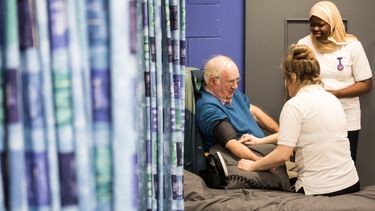
Foundation Nursing
RGU Nursing degrees are NMC-approved, and graduates are eligible to register with the Nursing and Midwifery Council (NMC) as a Registered Nurse.
Foundation Leading to Nursing
- RGU’s Nursing students are on placement for up to 50% of their degree programme.
- Students benefit from ongoing collaboration with the NHS and private sector partners, applying their new knowledge and skills in the workplace.
- Registration with the Nursing and Midwifery Council (NMC) is integrated into the programme.
Apply today and begin your journey towards a career that makes a difference.
Duration
- 2 semesters
Intakes
- September
- January
Location
- Aberdeen
Degree Programmes Available
By the time you graduate, you will be skilled in delivering compassionate care to adults who are experiencing acute/long-term illnesses and injury. Practical experiences are integrated throughout the course, both in the University’s state-of-the-art facilities (Clinical Skills Centre and Ward Area) and out on placement.
Find out more: BSc Nursing – Adult
This degree will give you an understanding of care for individuals across the lifespan and in a range of settings. Once qualified, you will work in partnership with children, young people under the age of 16 years old, and their families to improve their health and wellbeing. Practical experiences are integrated throughout the course, both in the University’s state-of-the-art facilities (Clinical Skills Centre and Ward Area) and out on placement.
Find out more: BSc Nursing – Children and Young People
Mental health nursing prioritises working with individuals, families and carers through the development of helpful relationships. Through simulation and practice-based learning, you will develop a range of interpersonal skills which support the development of therapeutic relationships. 50% of your time will be spent on clinical placement.
Find out more: BSc Nursing – Mental Health
| Year | Location | Duration | Fee |
|---|---|---|---|
| University Foundation | ICRGU | 2 semesters | ICRGU Fees |
| First Year Degree | School of Nursing, Midwifery and Paramedic Practice, RGU | 3 semesters | RGU Fees |
| Second Year Degree | School of Nursing, Midwifery and Paramedic Practice, RGU | 3 semesters | RGU Fees |
| Third Year Degree | School of Nursing, Midwifery and Paramedic Practice, RGU | 3 semesters | RGU Fees |
Programme Details
Interactive Learning Skills and Communication
This module will develop your academic literacy and communication skills in preparation for undergraduate study. It will also help you understand the norms and expectations of British higher education, as well as developing your academic research and communication skills.
ICT skills for Nursing
This module will provide an introduction to:
- Microsoft Word
- Microsoft Excel
- Microsoft PowerPoint
- Internet search tools
- Hacking and computer security
Mathematics for Nursing
This module will provide an introduction to mathematics and mathematical applications, covering topics such as:
- Common units used in medical science
- Dosage for solid medicines
- Dosage for liquid medicines
- Flow rate and IV drugs
Science for Nursing
You will learn about the structure and function of microorganisms and the factors concerned with their growth, survival and death. Topics covered will include microbial diseases, parasites, and transmission of disease. You will also explore defences against disease, including the immune system.
Social Sciences for Nursing
This module will cover an introduction to sociology and psychology. Topics will include:
- Concepts of health and ill health
- Gender
- Disability
- Cognitive and behavioural psychology
-
Developmental psychology
Preparing for a Career in Nursing
This module will introduce you to the primary principles of the healthcare profession in the UK, including:
- History of the NHS, the UK healthcare system and the changes that have occurred
- Laboratory work (nursing-related tasks and taking measurements)
- Ethics in nursing
Academic Writing and Critical Thinking
This module provides an introduction to the conventions of academic writing, including topics such as audience, style, structure and organisation, and revising and editing. You will also learn about aspects of critical thinking, such as cognitive biases, evaluating sources, and constructing an argument.
Entry requirements
In addition to meeting the minimum ICRGU Academic Entry Requirements, students applying for the Nursing programme will need to hold high school qualifications in Maths and one of the following: Chemistry, Biology, or Physics.
Due to the patient-facing nature of the Nursing programme and clinical placements during your studies at RGU, you will need to show evidence of the equivalent of IELTS 7.0 (with no band below 6.5) for registration.
Interview requirements
You will be required to pass an online video interview assessment with the School of Nursing prior to receiving a final offer.
The following course-related costs are not included in the course fees:
- The cost of books that you may wish to purchase
- Costs associated with your placement/study abroad
- Approximately £65 for uniforms (including polo shirt for clinical skills)
- Approximately £300 to £500 for occupational health checks. Actual cost will depend on the immunizations required.
- £52 for Protecting Vulnerable Group (PVG) check
- Hepatitis B Blood Titre Test – £32.00
- TB Mantoux Test /BCG Vaccination – £33.00/£24.00
- MMR Vaccination x 2 – £22.45 each
- MMR Blood Test – £31.00
- Varicella Blood Test /Vaccination – £21.00/£33.00
Clinical Skills Facilities
Campus Facilities
Robert Gordon University’s beautiful riverside campus provides the perfect learning environment, featuring the following:
- The Clinical Skills Centre, with many different rooms and laboratories for you to practise your clinical skills.
- Our Ward Area, designed to replicate a real hospital where you can gain confidence in your clinical skills in a realistic and safe environment.
Take a tour of our industry-standard facilities and find out what we have to offer.
Tour the Campus